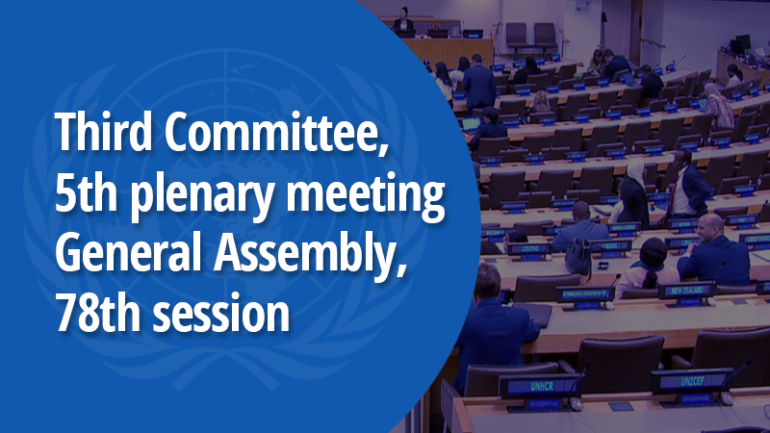Third Committee, 5th plenary meeting – United Nations General Assembly, 78th session

- Posted by admin
- Posted in Statement & Remarks
I thank you, Mr. Chair, for giving me the floor. My delegation also thanks the Secretary-General for his report under this agenda item and takes note of the recommendations contained therein.
Despite the positive uses of Information and Communication Technologies (ICT) in transforming societies, stimulating jobs, improving productivity, and accelerating inclusive growth for sustainable development, we are ever made aware of the risks they pose when in the wrong hands.
Wrongly applied, ICT has been used in exploiting women and children online, in recruiting vulnerable youth into extremist ideologies and terrorist networks as well as for the propagation of hate speech that have undermined the rights of people and destabilized individuals, economies, and nations. These challenges with the criminal application of ICT underscore the need to facilitate the orderly growth and development of ICT and protect it from criminal elements.
Mr. Chair,
It is therefore important to leverage the tools available at the international, regional and national levels to harness the benefits of technologies for development and curtail the vices associated with it. We would make four (4) additional points.
First, we believe that the existing global and regional instruments and initiatives such as the UN Convention against Corruption (UNCAC), the S-G Roadmap on Digital cooperation, and the Convention on Cybercrime (Budapest Convention) remain essential in tackling the issue.
Additionally, we welcome GA resolution A/RES/74/247 which laid the foundation for the establishment of an Ad Hoc Committee leading to the ongoing negotiations to elaborate a novel global convention on the subject. We recognise the progress being made in the negotiations and encourage all Member States to continue to engage in good faith and in a manner that ensures that the Convention when adopted will stand the test of time in addressing the evolving cyber-security challenges of our time.
Equally important is the need to heed to the S-G’s call in his New Agenda for Peace for the development of governance frameworks, multilateral accountability mechanisms, and regulations to address the risks and challenges posed by digital technologies in the context of peace and security.
Secondly, Ghana sees value in enhancing partnerships with regional instruments such the AU Convention on Cybersecurity and personal data protection [The Malabo Convention] and ECOWAS Cyber Security Strategy. These regional instruments provide home grown and region-specific remedies to complement global efforts in tackling the situation. In this regard, we call for the provision of adequate funding and capacity building support to developing countries, especially in Africa, for improvements in areas such as monitoring, and prosecution of online abusers. We recognise the critical role of UNODC and other relevant UN agencies, and in this regard encourage their further support.
Thirdly, we consider it essential to prioritize the mainstreaming of gender into national ICT strategies and the development of policies to empower women and the youth with the skills to make them effective stakeholders in developing national ICT resilience. Enhancing the role of CSO’s and private sector especially technology giants who have the wherewithal to support is encouraged.
Lastly, with an internet penetration surge of almost 14.7 million between 2012 to 2022 (17 million users), the government of Ghana is determined to ensure a safe cyber space. In addition to integrating cyber-security elements into national strategies through the adoption of the Cyber Security Act 1038 (2020) as well as the provision of requisite ICT skills to women and the youth, other initiatives are being implemented to enhance security in the cyber-space such as the declaration of every October as the National Cyber Security Awareness Month (NCSAM) to create awareness of cyber threats and advance deterrence measures. This year’s awareness month, which commenced in Accra yesterday, is on the theme ‘Promoting a Culture of Digital Safety’. It seeks to highlight the importance of cultivating collective mindset and behaviors that value and promote responsible online practices and the protection of personal information among others.
In conclusion, Ghana believes that the commitment of Member States in fulfilling their obligations under the global and regional instruments, coupled with support from relevant bodies such as the UNODC and donor partners to enhance the capacity building, remains an effective way in preventing the abuse of the cyber space for criminal purposes.
I thank you.
